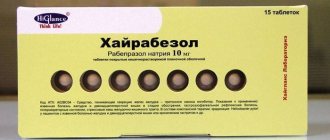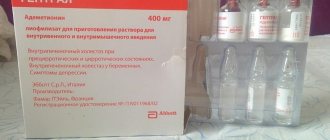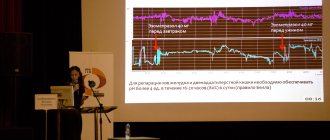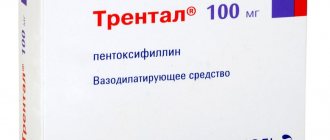Pharmacological properties of the drug Razo
Rabeprazole is an antiulcer agent. The mechanism of action is associated with inhibition of the specific enzyme H+/K+-ATPase in the parietal cells of the gastric mucosa. Rabeprazole, as an inhibitor of the gastric proton pump, blocks the final stage of hydrochloric acid formation. This action, depending on the dose, leads to inhibition of both basal and stimulated secretion of hydrochloric acid, regardless of the nature of the stimulus. The drug does not have anticholinergic properties and does not block H2 receptors. After oral administration, it is quickly and completely absorbed into the gastrointestinal tract. The antisecretory effect develops within 1 hour after oral administration at a dose of 20 mg. The maximum decrease in gastric pH is recorded 2–4 hours after the first dose. A stable antisecretory effect develops 3 days after the start of treatment. Absolute bioavailability is 52% due to primary passage through the liver. The bioavailability of rabeprazole does not increase with multiple doses. Food intake and timing of administration throughout the day do not affect the absorption of rabeprazole. Plasma protein binding - 97%. Metabolized in the liver with the participation of enzymes of the cytochrome P450 system. About 90% of rabeprazole is excreted in the urine, mainly in the form of metabolites, the remainder is excreted in the feces.
Side effects
Razo is a relatively safe drug, and side effects most often occur when medical prescriptions are not followed, as well as when deviating from the recommendations specified in the instructions for use.
Most often, the drug has a negative effect on the digestive tract. In this case there are:
flatulence,- diarrhea,
- nausea,
- vomit,
- constipation,
- belching,
- dry mouth.
There are also known cases of allergic reactions. The most common of them:
- skin rash,
- itching
In exceptional cases, the patient may complain of chills, myalgia, fever, hyperhidrosis, and laboratory tests may reveal signs of leukocytosis.
Contraindications
Despite the good safety profile, there are contraindications to the use of Razo. These include:
- sensitivity to rabeprazole,
- sensitivity to substituted benzimidazoles,
- pregnancy,
- breastfeeding period,
- age up to 14 years.
In addition, before taking the drug, it is necessary to reliably exclude the presence of stomach cancer, since taking Razo can mask the symptoms of a progressive tumor for a long time, thereby preventing the correct diagnosis.
Patients with impaired renal function should monitor GFR throughout the course of treatment and, if necessary, reduce the dose.
In the presence of serious liver dysfunction, monitoring of ALT and AST levels is recommended.
During pregnancy
Pregnancy and lactation are a strict contraindication for the use of Razo. It was experimentally established that rabeprazole penetrates the placental barrier.
And despite the fact that studies on mice did not reveal teratogenic properties of the substance or reduce fertility, taking rabeprazole is not recommended, since the effect of the drug on the human fetus is unpredictable.
Rabeprazole is excreted in breast milk, so it is worth choosing other drugs during lactation.
Use of the drug Razo
Adults take the tablets whole before meals without chewing. For peptic ulcers of the stomach and duodenum (in the absence of Helicobacter pylori), a dose of 20–40 mg is prescribed once a day in the morning or evening. You can take the drug at a dose of 10 mg 2 times a day. Duration of treatment is 2–4 weeks in case of localization of the ulcer in the duodenum, 2–6 weeks in case of localization of the ulcer in the stomach. For gastroesophageal reflux disease, 20 mg of the drug is prescribed 2 times a day for 4–8 weeks. Maintenance dose: 10–20 mg/day for up to 1 year. The dose is determined individually. For functional dyspepsia - 20 mg once a day or 20 mg 2 times a day for 2-3 weeks. For Zollinger-Ellison syndrome, the initial dose is 60 mg/day. Further doses and duration of treatment should be selected individually depending on tolerability and therapeutic effect. The dose may be increased to 100–120 mg/day. Helicobacter pylori infection (in combination with antibacterial agents), rabeprazole is prescribed at a dose of 20 mg 2 times a day, for example, in combination with clarithromycin (500 mg 2 times a day) and amoxicillin (1000 mg 2 times a day) for 7 weeks . For chronic gastritis with increased acid-forming function in the acute stage - 20 mg 1-2 times a day for 2-3 weeks.
Price
Average price in Russia
The minimum price for the drug in Russia is about 300 rubles, and the maximum is about 400. On average, Razo costs 360-370 rubles for a package consisting of 2 blisters.
Average price in Ukraine
Razo is not sold in Ukraine, but there you can easily find analogues of the drug with the same active ingredient. The most common:
- Rabeprazole-Health (60-80 UAH),
- Pariet (350-370 UAH).
Video on the topic: Dyspepsia
Special instructions for the use of the drug Razo
Before starting treatment, it is necessary to exclude the possibility that the patient has malignant neoplasms, since treatment with rabeprazole may mask symptoms and delay correct diagnosis. The drug is not prescribed to children, since there is no experience of its use in pediatric practice. Prescribe with caution to patients with severely impaired liver and kidney function. If drowsiness occurs, it is necessary to refrain from driving vehicles and/or operating other mechanisms that require increased concentration and speed of psychomotor reactions.
Compound
Razo tablets contain the following substances:
- Rabeprazole is the main active ingredient,
- Mannitol - this substance is necessary to reduce swelling of the gastric mucosa and improve the absorption of the drug, has a pronounced diuretic effect,
- Magnesium oxide heavy - has an anthracite effect, deactivates stomach acid, reduces the irritant effect of the latter on the mucous membrane,
- Sodium lauryl sulfate - helps improve the permeability of the drug components through the mucus layer and cell membranes. Has a foaming effect,
- Magnesium stearate,
- Hyprolose is low-substituted.
Razo drug interactions
Rabeprazole causes a powerful and long-lasting decrease in the secretion of hydrochloric acid in the stomach, and therefore can affect the kinetics of drugs whose absorption depends on the acidity of the gastric contents. When taken simultaneously with ketoconazole, rabeprazole causes a decrease in its concentration in the blood plasma and increases the minimum concentration of digoxin. Therefore, patients taking these drugs in combination with Razo should be under medical supervision to determine the need for individual dosage adjustments.
Storage conditions and periods
Razo is recommended to be stored in a dark, dry place, out of reach of children, at a temperature not exceeding +25 C.
The shelf life of the medicinal product is 18 months from the date of manufacture, subject to storage conditions.
After the expiration date, the tablets should be thrown away.
Reviews
Svetlana, 45 years old, Nizhny Novgorod “I have been taking this drug relatively recently, but I have already noticed a significant improvement in my condition. Two years ago I was diagnosed with a stomach ulcer; I suffered greatly from nighttime abdominal pain, frequent nausea and vomiting. I took many medications that only temporarily improved my condition. Since I started taking Razo, I have felt significantly better.” Igor, 30 years old, Moscow “I’ve been working very hard for the last five years, and as a result I’ve stopped eating normally and lost a lot of weight. Then abdominal pain appeared, I tried to treat myself, took gel and pills for heartburn, but they did not bring any effect. I had to see a doctor, who prescribed me the drug Razo and ordered me to start eating normally. After the first course I felt the effect. The pain went away and my appetite improved. Now I periodically undergo treatment, there are no stomach complaints.” Alexander, 20 years old, Krasnodar “When I started studying, I was constantly stressed, tired, and didn’t have time to have a proper snack, let alone eat. In my second year I started having abdominal pain and immediately ran to the hospital because I suspected an ulcer. But everything worked out, chronic gastritis was diagnosed. They prescribed me to take Razo tablets and eat smaller meals. After four weeks there is no pain, I eat well, even my mood has improved.”
Is there an alternative?
There are several analogues of Razo tablets on sale, but it is unsafe to independently change the drug prescribed by a doctor to another. If it is not possible to purchase a product recommended by a specialist, you should first consult with your doctor. Your doctor may recommend:
- "Zulbeks".
- "Rabeprazole".
- "Pariet."
Sometimes the doctor advises taking Beret tablets. The products “Rabelok” and “Noflux” have a good reputation. For some indications, the doctor may suggest Ontime medication as an alternative.
Overdose
There is insufficient information on intentional or unintentional overdose of rabeprazole. It is known that when taking Razo twice a day at 60 mg or once at a dose of 160 mg, side effects were minimal and reversible, so no medical intervention was required.
To date, a specific antidote for rabeprazole is unknown. Due to its good binding to plasma proteins during dialysis, it is poorly excreted. In case of proven intoxication, symptomatic and supportive therapy is carried out.
When is it not possible?
The medication is prohibited for pregnant women and mothers breastfeeding. The product should not be used by anyone under the age of twelve. The drug is not intended for persons whose body is overly sensitive to the main ingredient or auxiliary components used by the tablet manufacturer. Do not use the medicine if a hypersensitivity reaction to substituted benzimidazoles is observed.
The drug is prescribed with extreme caution if severe renal and liver failure is detected. Careful attention is required to minors over 12 years of age if they require treatment with Razo.
Subtleties of treatment
The body's response to a course of medication cannot be considered an indicator of the absence of malignant gastric formations. Before the start of the program and after its completion, it is necessary to evaluate the condition of the gastric cavity using an endoscope in order to clarify the presence or absence of cancer. It is known that rabeprazole can hide symptoms, which slows down the correct diagnosis.
If the patient has severe liver disorders, the course should be started very carefully, regularly checking the body’s performance. The ability of the active component of Razo tablets to correct the functioning of the thyroid gland has not been revealed. The use of medications that inhibit the proton pump increases the risk of femoral, wrist, and vertebral fractures. If a person receives the drug at an increased dosage for a year or longer, the risk of fractures becomes especially high.








